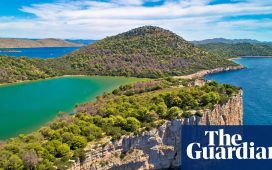Llyn Cwm Bychan, a lake high in Snowdonia national park, looks black and forbidding even on a sunny day, so it’s perhaps a good thing I can’t see it right now. It’s 10.30pm and only the contours of the land are visible, jagged and black, against the starry sky – and I am going to swim.
Wild Swim Snowdonia was founded earlier this year by Laura Sanderson and Meg Pugh, who run a year-round swim group and also guide visitors to the park’s most unspoiled spots. They have teamed up with Dani Robertson, Snowdonia’s Dark Sky officer, to host free, late-night swims under the stars. Family-friendly swims take place after dark on Harlech’s long sandy beach and, later in the evening, there are adult-only swims in the mountain lakes above it.

This lake is a bold choice for their inaugural night swim; it feels as close to real wilderness as you can find in the UK. By day, dry-stone walls and flocks of sheep betray man’s dominion over the heather, bog, mossy rocks and gnarled oak trees. By night, traces of human intervention are swept away – and the absence of light pollution is arresting.
Beside a campfire, Dani tells our group of 10 that it takes 20 minutes for your eyes to fully adjust to the dark, but the light of the Milky Way is already beaming across the sky. The conditions are perfect, and the almost magical nature of what we are about to do fills me with anticipation.
In 2015, Snowdonia became the 10th place in the world to receive International Dark Sky Reserve status, marking it as one of the least light-polluted places on Earth. Part of Dani’s brief is to cultivate more sustainable, year-round tourism for the park. Current visitor numbers on Snowdon itself (550,000 in 2018) are unsustainable. Dark-sky tourism is a perfect antidote to the summer rampage: it’s best during the winter, and encourages overnight stays rather than day trips. And in Wales 18% of the territory has protected dark skies status – one of the highest percentages in the world.

Most of our group are locals, but they are as intrigued as I am to hear what the stars mean in Welsh folklore. We learn that the constellation we know as Gemini represents not twins but brothers fighting over a woman. The brothers, Gwyn and Gwythyr, fight each other until May, when Gwyn (the good brother) comes out on top, ushering in summer and signalling that people should sow their crops.
Dark skies are good not only for culture and mythology: 60% of the park’s biodiversity depends on darkness. “People think we don’t have glowworms in the UK, but we do. They’re just dying out because of light pollution,” Dani says. “It’s only the females that glow, and if it’s not dark enough the males can’t find them.”
Darkness affects human health, too, with light pollution emerging as a driver of depression. On the other hand, cold-water swimming is said to have health benefits, including alleviating depression.
Wild Swim Snowdonia co-founder Meg grew up on a farm to the north-west of the national park with open water all around, and she and her sisters would wade into lakes and rivers and hurl themselves into the sea at any opportunity.
On a sheep-grazed promontory at the edge of the lake, we change into costumes and wetsuits. Meg pairs us off, and each pair is given an orange float.
I’ve swum in my fair share of lakes and rivers, and I understand wild swimming’s allure: the afterglow – a rush of blood fuelled by adrenaline and cortisol – and the feeling that you breathe deeper and that your lungs are somehow cleaner than before. But standing here on dewy grass and sheep poo in a swimming costume an hour after my bedtime, its appeal is momentarily forgotten. I find solace in the fact that even hardened wild swimmers like Meg admit to feeling dread at getting in.

We shuffle out into the lake in pairs, laughing and joking. My partner, Nedw (pronounced Ned-ooh), is a tree surgeon in his 50s. He confesses he is not a strong swimmer, but five months after he spotted the group’s ad in a local paper he’s hooked. He’s invested in a wetsuit and plans to swim throughout the winter.
The lake is warmer than I’d expected, like a cool bath. Water temperature lags behind the seasons by as much as three months, so early autumn is actually the warmest time to swim, Meg says.
The lakebed falls away steeply and we form a floating crocodile, marvelling at the impossibly complex star-scape that is dense with constellations, nebulae, comets and planets. I turn to see the Plough rising to the north, five of its stars peering over the mountain’s edge. Dani points out a satellite, chugging slowly across the sky. And then a piece of space junk, locked in a graveyard orbit. “Shooting star!” she shouts. I spot it just before it burns away.
It’s not until afterwards that I reflect on how the darkness honed my senses, how much information I took in without the distraction of daylight.
“Most people walk to see a lake – they don’t go in. But by going in, you get so much more information – you experience it in 3D,” Nedw says. Swimming by night adds another dimension again. Afterwards, we return to the fire. The bright flames extinguish our night vision and clouds begin to curtain the sky as we warm ourselves with rum and hot tea.
• Wild Swim Snowdonia and Snowdonia national park host evening sea swims (ages 8+) and night-time lake swims (ages 18+). The next scheduled swim is at Llyn Cwm Bychan on Friday 18 October at 8.30pm
Looking for a holiday with a difference? Browse Guardian Holidays to see a range of fantastic trips














